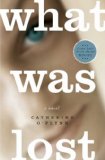Summary | Excerpt | Reading Guide | Reviews | Beyond the book | Read-Alikes | Genres & Themes | Author Bio

A Novel
by Catherine O'FlynnA tender and sharply observant debut novel about a missing young girl - winner of the Costa First Novel Award and long-listed for the Booker Prize, the Orange Prize, and The Guardian First Book Award
In the 1980s, Kate Meaney—“Top Secret” notebook and toy monkey in tow—is hard at work as a junior detective. Busy trailing “suspects” and carefully observing everything around her at the newly opened Green Oaks shopping mall, she forms an unlikely friendship with Adrian, the son of a local shopkeeper. But when this curious, independent-spirited young girl disappears, Adrian falls under suspicion and is hounded out of his home by the press. Then, in 2003, Adrian’s sister Lisa—stuck in a dead-end relationship—is working as a manager at Your Music, a discount record store. Every day she tears her hair out at the outrageous behavior of her customers and colleagues. But along with a security guard, Kurt, she becomes entranced by the little girl glimpsed on the mall’s surveillance cameras. As their after-hours friendship intensifies, Lisa and Kurt investigate how these sightings might be connected to the unsettling history of Green Oaks itself. Written with warmth and wit, What Was Lost is a haunting debut from an incredible new talent.
Every once in a while a book comes along that takes your breath away. What Was Lost is such a book. Catherine O'Flynn's stunning first novel contemplates the loss of innocence and the dullness of modern life. A simple story about two people's investigation of a young girl's mysterious disappearance grows into a larger rumination on modernity, maturation, and love under O'Flynn's deft and empathetic pen...continued
Full Review
 (590 words)
(590 words)
(Reviewed by Sarah Sacha Dollacker).
A shopping mall is defined as a collection of shops usually in one main building
or close series of buildings. It would seem that shopping malls date back to at
least the 10th century when it is said that
Isfahan's Grand Bazaar in Iran was founded (the current buildings date to
the 17th century).
The Grand Bazaar in Istanbul, Turkey was built in the 15th century and is
still one of the biggest covered markets in the world.
In the Western world, modern-day shopping malls trace their roots to the
mid-19th Century covered rows of shops known as arcades, such as the
Royal Opera Arcade (Britain's oldest built in 1818) which was closely
followed by others such as the more famous
Burlington Arcade
which opened in London ...

If you liked What Was Lost, try these:

by Monica Ali
Published 2004
This gorgeous first novel is the deeply moving story of one woman, Nazneen, born in a Bangladeshi village and transported to London at age eighteen to enter into an arranged marriage.

by Jonathan Coe
Published 2003
As the world appears to self-destruct around them, four teenage friends hold together to navigate the choppy waters of a decidedly ambiguous decade - the 1970s.